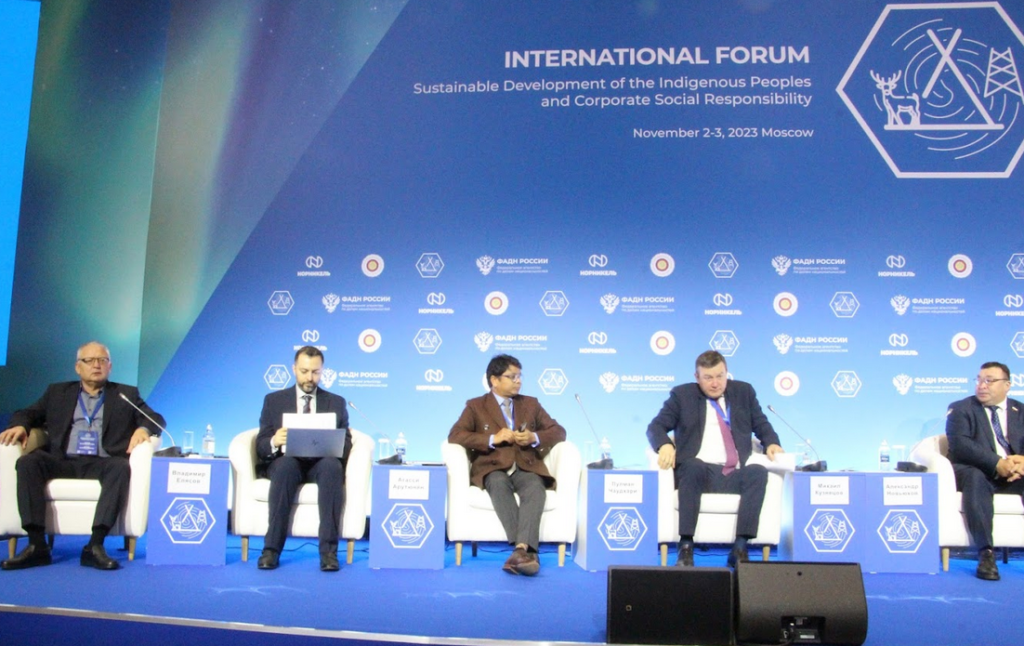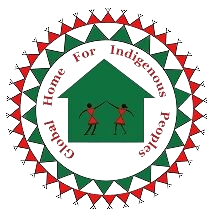Nov 2-3, 2023, Moscow

Mr. Phoolman Chaudhary (Asian Indigenous International Network, Global Home for Indigenous Peoples) spoke at the International Forum: Public-Private Partnership for Sustainable Development of Indigenous Peoples that was jointly organized by Federal Agency for Ethnic Affaires of Russia, Russian Association of Indigenous Peoples of the North in partnership with the UN Global Compact Russia Network including the Indigenous Peoples of Russian Federation.
Mr. Phoolman spoke on November 3, 2023 during the panel session “Promoting socioeconomic development of Indigenous Peoples: Practices and Potential”
Good morning and Jay Gurbaba all of you. Distinguished panelist, Distinguished delegates, ladies and gentlemen.

I am delighted to be here among you all and be part of a discussion that is very important for Russian Federation, its private sectors, and its Indigenous Peoples. I sincerely would like to thank the organizers, Federal Agency for Ethnic Affaires and the Russian association of Indigenous Peoples of the North in partnership with the UN Global Compact Russia Network including the Indigenous Peoples of Russian Federation for inviting me here in beautiful city Moscow.
With Indigenous peoples worldviews, way of life, traditional knowledge, and their reciprocal relationship with their traditional territories, Indigenous Peoples of Russian add a beautiful layer of diversity to the Russian Federation. As a member of Indigenous Tharu Peoples from Nepal, I see them as the guardians and stewards of their traditional territories. They are the gems of Russia.
Hence, I invite all of you to protect and promote the diversity that Indigenous Peoples of the North, Siberia and the Far East carry. I see diversity as a strength and I encourage all you in this room to see diversity as the national pride and strength. It makes me very happy that this International Forum sees Indigenous Peoples as strength and I hope that we will keep such spirit alive in the future as well.
I come from the southern part of Nepal that has sub-tropical forests and my village is very close to the forest. My forest that my ancestors dwelled speaks to me. It teaches me that everyone has a place like the forest has. It has space for small plants, shrubs, climbers, tall trees, and thousands of flora and fauna. A healthy forest is one that nurtures and fosters diversity. As humans, we can also celebrate diversity. The promotion of socio-economic development for Indigenous Peoples are important, however Indigenous Peoples must be involved in all aspects of the discussions making process as partners, as equals, as collaborators when it is about their livelihoods and their future.
Indigenous peoples have the right to determine and develop priorities and strategies for exercising their right to development.
What kind development Indigenous Peoples want in their territories, is a question we must ask the Indigenous Peoples. The Indigenous Peoples of Russian Federation can be a solid partner of Russian Federation’s economic prosperity if we can strengthen and promote meaningful, respectful, and reciprocal engagement with them. This forum is a great initiative towards that goal.
I hope that the infrastructure projects and mineral extraction and economic development projects in Indigenous Peoples territories do not displace Indigenous Peoples, pollute their water sources (rivers, and lakes), and erode their sustainable lifestyle and traditional knowledge. For Indigenous Peoples of the North, Siberia and Far East, their reindeer, the fisheries, water are their wealth and their livelihood. We need to work on a development model that protects their livelihood and their way of life as well. If their reindeer routes are damaged, their well-being can be endangered as reindeer are an important part of their food systems. Such priorities must be considered when developing the project plans.
Additionally, we are in 2023 and Indigenous Peoples rights have become a matter of international concern and numerous member states have committed to improve the situation of Indigenous Peoples living in their county by adopting the United Nations Declaration on the Rights of Indigenous Peoples (UNDRIP) and creating national laws that recognizes their rights to self-determination, customary rights to their traditional territories, and right to access their traditional territories and natural resources.
The member states who have not signed the Declaration should consider ratifying it to enhance the well-being of Indigenous Peoples living in their country for an inclusive development so that no one is left behind. As we have gathered here today, we all have the responsibility and moral obligation to:
- promote and protect the rights Indigenous Peoples for their self-determination,
- include Indigenous Peoples and their organizations in all decisions making process that affects their livelihoods and their future,
- ensure that states and business entities (local, national, and international) should obtain their free prior and informed consent prior to the approval of any projects affecting their land or territories, and other resources, particularly in connection with the development, utilization or exploration of minerals, and water or other resources.
- ensure that both the public and private sector are making a good use of the UN Guiding Principles on Business and Human Rights..
- Similarly, we need to think about:
- the human rights due diligence process to identify, prevent,
mitigate and account for how we address the impacts corporate
investments on human rights; - processes to enable the remediation of any adverse human rights
impacts they cause or to which they contribute. - We need to gauge human rights risks, business enterprises
should identify and assess any actual or potential adverse human
rights impacts with which they may be involved either through
their own activities or as a result of their business relationships. - Remediation where business enterprises identify that they have
caused or contributed to adverse impacts, they should provide for
or cooperate in their remediation through legitimate processes. - The state’ duty to protect against business-related human rights
abuse, States must take appropriate steps to ensure, through
judicial, administrative, legislative or other appropriate means,
that when such abuses occur within their territory and/or
jurisdiction those affected have access to effective remedy
Therefore, public-private partnerships can be a valuable approach to promote the sustainable development of indigenous peoples. So, applying these ways by identifying the specific needs and challenges faced by indigenous peoples could include access to education, healthcare, infrastructure, land rights, and economic opportunities.
I would say, to consider scaling up the partnership model to benefit more Indigenous peoples across the World. Remember that each indigenous peoples is unique, and the approach should be tailored to their specific needs and cultural context. It’s crucial to respect their self-determination and engage in a meaningful, collaborative manner that respects their rights and traditions.
Furthermore, making progress in implementing the 2030 Agenda for Sustainable Development Goals and the Paris Agreement on climate change also requires renewed efforts in addressing the rights of indigenous. Hence, we cannot continue to ignore the rights and aspirations of the Indigenous peoples. It is time we listen and do the right thing.
At the same time Russian Federation is one of the biggest Country in the World and it can be a leader when it comes to protecting and promoting the rights of Indigenous Peoples.
Finally, I thank all for your kind patience and look forward to your close cooperation on a common agenda on indigenous peoples rights at all levels.
Thank you!

Comments are closed.
I really think this is the rights of all indigenous peoples should coexist no matter where ever you come from.